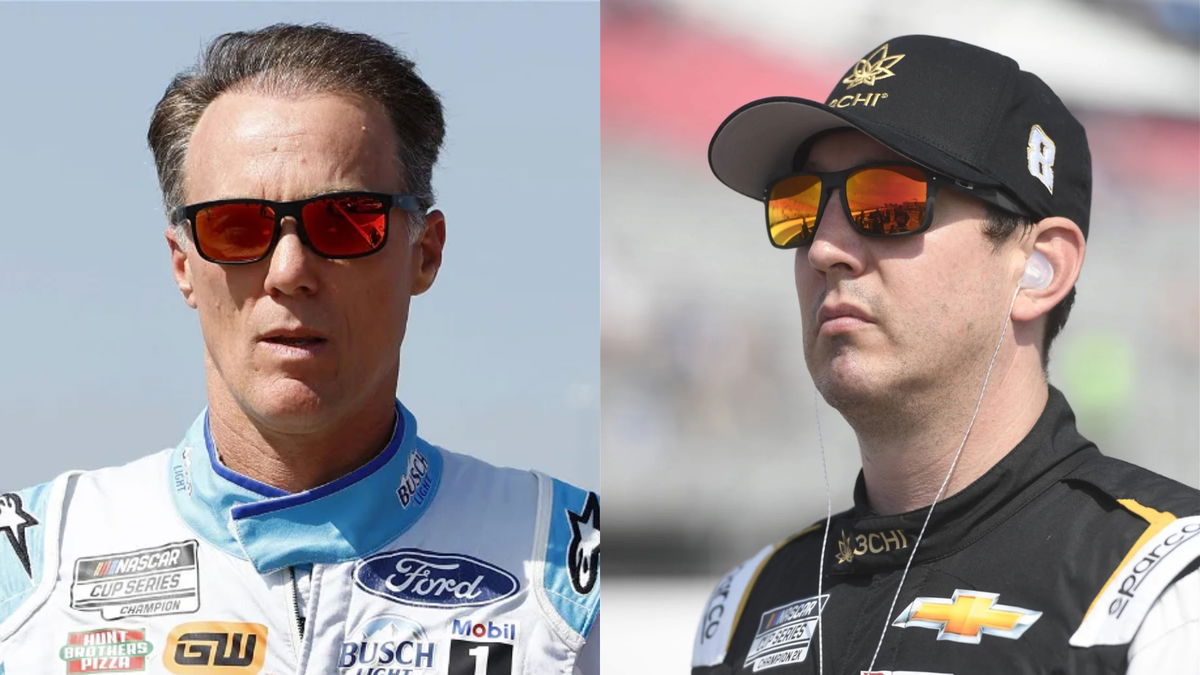
Imago
Image Credits: Imago

Imago
Image Credits: Imago
Kevin Harvick rarely holds back when discussing the state of NASCAR, and his recent comments proved no exception. Harvick reflected on a defining moment in recent NASCAR history, Kyle Busch’s 2015 championship season, as a way to shed light on the evolving nature of NASCAR’s championship format.
Watch What’s Trending Now!
With the sport in the middle of a debate over playoff rules and legitimacy, Harvick’s perspective bridges two eras, spotlighting how changes in the points system have reshaped what it means to be a champion in NASCAR.
The formats can’t be compared, says Harvick
During a candid chat with co-hosts Mamba Smith and Kaitlyn Vincie on his Happy Hour podcast, Kevin Harvick opened up about a topic that has long been a point of contention: the modern NASCAR playoff format versus the old, season-long points system. The conversation was sparked by remarks from NASCAR executive Steve O’Donnell, who confirmed that the playoff format is slated for change, setting the stage for a broader reflection on how champions are crowned in today’s Cup Series.
Harvick was quick to drive home the idea that the current playoff era is fundamentally different from the past. “It’s super hard to compare the guys who raced in this system to legends like Dale Earnhardt,” Harvick explained. The old points system, he reminded listeners, was about consistency, endurance, and the brutal grind of an entire season. Every race counted, and every mistake could cost a championship.
“No way Denny Hamlin ever decides to miss Mexico back then,” Harvick added, referencing a recent real-life example where Hamlin skipped a race for personal reasons, something unthinkable in the old format because missing a race was simply too costly. Harvick carefully differentiated between criticizing a driver’s personal choices and pointing out how the system shapes those choices. He understood the human element behind such decisions but stressed how differently drivers operate when “those weeks are on the line.”
His personal take was crystallized when he looked back at his own career: “I thought my 2015 season was better than my 2014 season. Ultimately, I lost the championship to a guy that missed eleven races.” That guy was Kyle Busch, who, after a major Daytona crash, missed almost a third of that season but managed to come back and win five races. The runner-up clinched the championship mainly due to the structure of the playoff format and the medical waiver system.
Harvick’s point was clear: the playoff format has fundamentally changed what a championship looks like. The days when consistency over 36 races was king have given way to a system that prioritizes clutch wins and high stakes in select races, sometimes at the expense of steady performance throughout the year. “You can’t compare what we’re doing now with what happened before,” he said with a measured tone, acknowledging that the new system has made direct comparisons unfair and complex.
In recent years, Harvick has doubled down on this critique, calling the current playoff system “embarrassing” when it allows drivers who dominate the season to lose championships due to one unpredictable or off-day finish in a single event. He pointed to the Truck and Xfinity Series’ domination by Corey Heim and Connor Zilisch, warning that if either doesn’t win their respective championships despite massive season-long success, it would cause a “nuclear meltdown” within the sport.
For Harvick, the stakes go beyond individual seasons; they touch the credibility of NASCAR’s entire championship narrative. He has also pointed out the disconnect between NASCAR’s quest for television drama and the traditional sporting merit, highlighting that the “one-race, best-finisher-takes-all” finale may generate drama but simultaneously diminishes the meaning of hard-fought points earned throughout a long schedule.
Kyle Busch defends his legacy amid the ongoing championship debate
Harvick’s remarks reopened a raw discussion around Kyle Busch’s legacy and the fairness of NASCAR’s playoff system. Busch’s 2015 championship, won despite missing nearly a third of the season, has long been a controversial benchmark. Recently, former NASCAR Truck driver Landon Huffman reignited that debate on social media, tweeting pointedly about Busch’s absences and questioning the legitimacy of crowning a champion under such conditions.
Busch, known for his fiery personality, did not hold back, responding with middle-finger emojis, a sign that the criticism stings deeply. Over the years, Busch has expressed that the key to success isn’t the format itself but knowing the rules and adapting strategically. “If you know what it is going in, exploit it … figure out your best way through the system,” he has said.
The medical waiver rule, which allowed Busch to return to playoff contention after injury, was intended to provide fairness for drivers facing extenuating circumstances. NASCAR’s leadership, including then-CEO Brian France, has defended it, saying they never wanted to punish drivers sidelined by accidents. However, critics, including Harvick, argue that awarding a championship to a driver who misses so many races muddies the definition of what it means to be a champion.
This debate isn’t isolated to Busch’s situation. Many have voiced frustration with the playoff format’s “win-or-go-home” style, especially when season-long dominance doesn’t guarantee a title. Harvick has highlighted recent examples where dominant drivers like Corey Heim and Connor Zilisch risk losing championships because of the current points structure, calling it “embarrassing” if they don’t win despite overwhelming season-long success.NASCAR’s officials, aware of these criticisms, are planning to revise the playoff system to better balance consistency and drama.
Harvick’s and Busch’s perspectives illustrate the tension between entertainment and sporting fairness that NASCAR is striving to resolve. As Busch works to rebuild and refresh his team for upcoming seasons, the scrutiny over his past championship years and the playoff rules remains a defining narrative. For Harvick and many within the sport, the hope is a system that rewards true season-long excellence while keeping fans engaged until the final lap a championship format that respects legacy and hard work on every track, every week.







